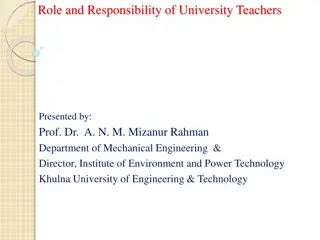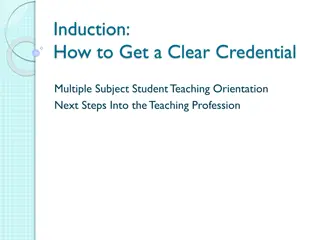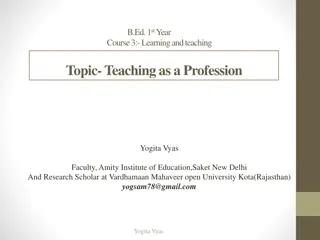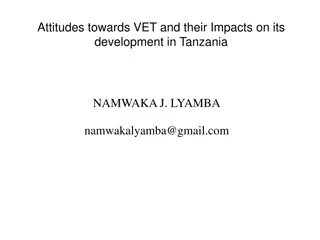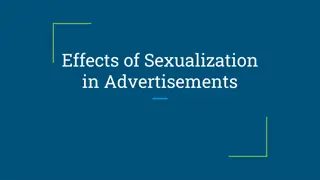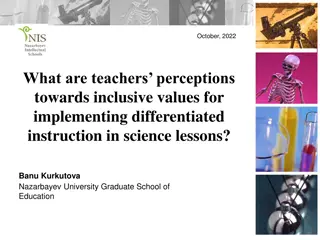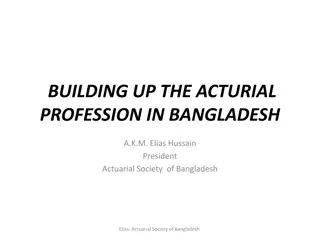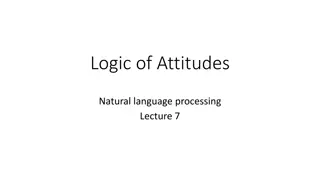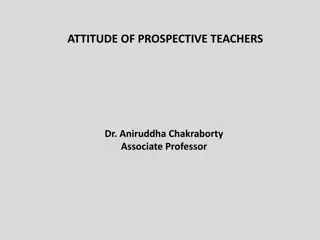Attitudes of PGDE Teachers Towards the Teaching Profession: A Study
Attitude plays a crucial role in a teacher's performance. This study investigates the attitudes of Post Graduates Diploma in Education (PGDE) teachers towards the teaching profession. Findings show that while attitudes related to academic responsibility, social recognition, and professional satisfaction are positive, areas such as financial benefits and recognition for professional development need improvement. Gender differences did not significantly impact attitudes. The study aims to enhance PGDE teachers' attitude levels towards their profession.
Download Presentation

Please find below an Image/Link to download the presentation.
The content on the website is provided AS IS for your information and personal use only. It may not be sold, licensed, or shared on other websites without obtaining consent from the author. Download presentation by click this link. If you encounter any issues during the download, it is possible that the publisher has removed the file from their server.
E N D
Presentation Transcript
Attitudes of Post Graduates Diploma in Education(PGDE) Attitudes of Post Graduates Diploma in Education(PGDE) Teachers Towards Teaching Profession Teachers Towards Teaching Profession. . Introduction: Attitude is defined as predisposition to respond favorably or unfavorably to specific situations, concepts, objects, institutions or persons. Attitude is developed through experience and it influences the behavior of an individual towards the stimuli. A teacher s attitudes towards his profession can effect how he perform his duties as a teacher. Present study investigate the attitudes of PGDE teachers towards the teaching profession and some factors effecting to it. Findings can be used to improve the attitude level of PGDE teachers towards their profession.
Objectives of the study Objectives of the study Main objective is to study the attitudes of PGDE teachers towards their teaching profession. Specific objectives are To study the attitudes of PGDE teachers towards different aspects of the teaching profession. To study the influence of gender on the attitudes of PGDE teachers towards teaching profession. To study the attitude levels of different degree holders of PGDE towards teaching profession. To study the relation between teaching experience of PGDE teachers and their attitudes towards teaching profession.
Methodology Methodology Survey methodology was used. Population and sample: teachers who follow post graduate diploma in education is the population. Randomly selected 100 graduate teachers who follow PGDE week-end (Sinhala medium) 2016/2018 is used as the sample. Likert type attitude scale (five point scale) was used to collect the data. Scale consisted of five sub scales namely academic responsibility, social recognition, professional satisfaction, need for the professional development, financial benefit, recognition for the professional development. Data analyse was done by using descriptive statistics methods and t tests and ANOVA tests.
Findings Findings Level of attitudes towards teaching profession (1-5 scale) Sub scale n Mean SD Academic responsibility 100 3.9 .55 Social Recognition 100 3.4 .55 Professional satisfaction 100 3.9 .67 Need for professional development 100 4.7 .53 Financial benefit 100 2.2 .98 Recognition for professional development 100 1.8 .84 Attitude level is not satisfactory. However Mean values reveals that the attitudes related to academic responsibility, social recognition, professional satisfaction and need for professional development are above average. But attitudes towards financial benefits and recognition of professional development seems to be low.
Gender vice differences of attitudes Sub scale Male Female t p- value n Mean SD n Mean SD Academic responsibility 15 4.0 .56 85 3.9 .55 .50 .61 Social Recognition 15 3,5 .65 85 3.3 .50 1.25 .22 Professional satisfaction 15 4.1 .50 85 8.9 .70 1.27 .21 Need for professional development 15 4.7 .40 85 4.6 .55 .55 .58 Financial benefit 15 2.4 1.33 85 2.1 .91 .64 .52 recognition for professional development 15 2.0 1.09 85 1.7 .78 .90 .37 Results reveals that there is no significant differences in attitudes related to each aspect between male teachers and female teachers
Attitude level of teachers Influence of the degree Sub Scale Arts Science Commerc Other F p Mean SD Mean SD Mean SD Mean SD Academic responsibility 3.9 .60 3.9 .50 4.1 .23 4.1 .33 .34 .79 Social Recognition 3.4 .50 3.2 .51 3.1 1.23 3.1 .77 1.07 .36 Professional satisfaction 4.0 .64 3.6 .67 3.1 .88 4.0 .88 2.68 .06 Financial benefit 2.3 1.01 1.9 .99 2.0 .35 2.2 .50 .98 4.1 Need for professional development 4.6 .56 4.7 .48 4.5 .70 5.0 .60 .69 .55 recognition for professional development 1.8 .89 1.5 .71 2.0 .35 2.0 .55 .97 .42 The kind of degree has no significant effect on the attitude at alpha=.05 level but post hoc test reviled that attitudes of science degree holders with respect to financial benefit and professional satisfaction is significantly lower than arts degree holders at alpha = .05 level.
Correlation Correlation between attitudes attitudes towards towards teaching between teaching teaching profession teaching experience experience and profession and Sub scale Pearsons correlation coefficient(r) P-value Academic responsibility .11 .29 Social Recognition .01 .96 Professional satisfaction .09 .32 Need for professional development .02 .78 Financial benefit -.17 .09 Recognition for professional development .18 .08 There is no significant correlation between duration of teaching experience and different aspects of attitude towards teaching profession
conclusions conclusions Attitude level of PGDE Teachers is not so satisfactory. Gender or the degree does not seems to be an important factor that affect to teachers attitudes towards teaching profession. Duration of teaching experience also does not correlate with the attitude level significant. findings clearly show the need of giving opportunities to graduate teachers to develop their attitudes towards teaching profession specially with regard to the aspect of financial benefits and recognition for professional development




